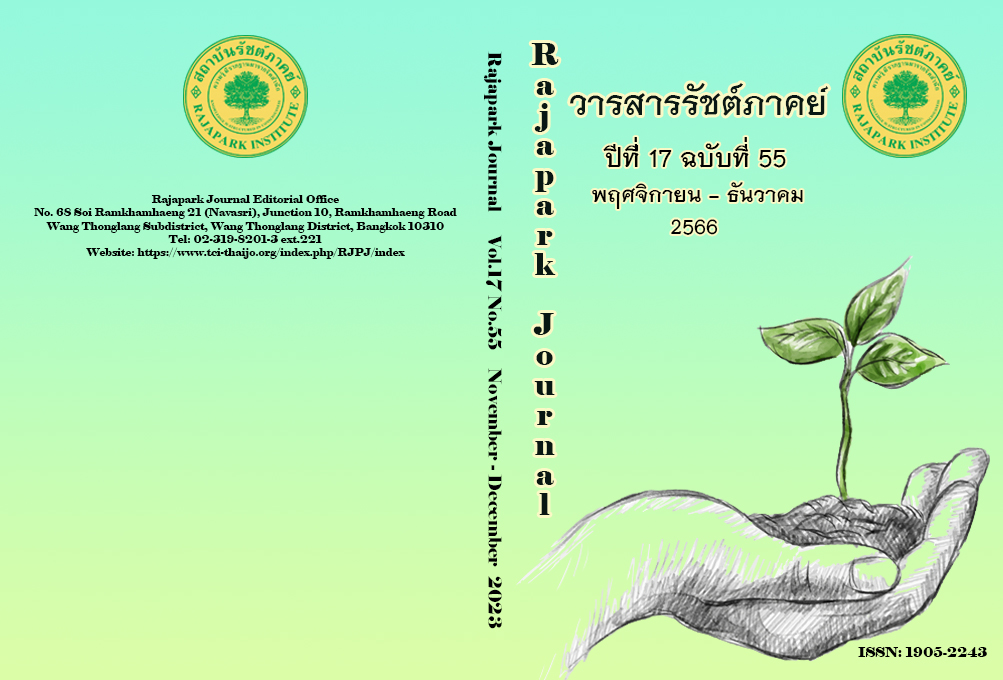Value Chain Management of Original Equipment Manufacturing Business Supplement Products in Thailand
Main Article Content
Abstract
This research aimed to study: 1) the conditions and problems of original equipment manufacturing business supplement products in Thailand; 2) the competitive environment; and 3) propose guidelines for managing the value chain. This research is qualitative. The main informants were 21 experts, using the principles of the Delphi technique and purposive sampling. The data collection involved in-depth interviews, analyzing the content, and describing it. The results of the research found that: 1) The original equipment manufacturing business of supplement products uses a strategy to create differentiation by selecting raw material suppliers that have developed important extracts that are used as new innovative ingredients; there is sufficient budget for product research and development, but there is a lack of personnel in this area; and there is a standard operating system controls quality to meet the standards of ISO, HACCP, GMP, and GHP. 2) The business competition is high because the number of new and existing competitors is likely to increase. It is a business that can generate a high income and is easy to set up, with access to funding and the use of production technology, using online media that can reach customers quickly and on a larger scale than in the past. 3) Guidelines for the value chain are: creating a system for inspecting raw materials before receiving them according to specific criteria according to the standards of each type of raw material; focusing importance on the quality inspection process throughout the process; and having a dedicated marketing expert who is responsible for giving advice both within the organization and to customers who wish to request advice in various areas.
Article Details

This work is licensed under a Creative Commons Attribution-NonCommercial-NoDerivatives 4.0 International License.
Views and opinions appearing in the Journal it is the responsibility of the author of the article, and does not constitute the view and responsibility of the editorial team.
References
Angsuratkomol, T. (2016). Factors that Affect the Creation of Competitive Advantage of Enterprises Yard Cassava Thailand. Case Study entrepreneur yard. Ubon Ratchathani[Master’s thesis, Bangkok University].
Bunyathawornchai, W., & Thephanon, Y. (2020). Attitudes and Services Affecting on the Dietary Supplement Consumption Behavior of the Elderly in Bangkok and Metropolitan AREA. In Proceedings of The 15th RSU National Graduate Research Conference, 895-908. https://rsujournals.rsu.ac.th/index.php/rgrc/article/view/1904
Food and Drug Administration. (2022). Entrepreneur information. https://www.fda.moph.go.th/Pages/HomeP_D2.aspx.
Jensen, C. (1996). Delphi in Depth: Power Techniques from the Experts Berkeley. McGraw-Hill.
Hatta, I. H., Rachbini, W., & Parenrengi, S. (2018). Analysis of product innovation, product quality, promotion, and price, and purchase decisions. South East Asia Journal of Contemporary Business Economics and Law, 16(5), 183-189. https://seajbel.com/wp-content/uploads /2018/11/seajbel5_268.pdf
Kamchaung, W., Attharangsan, N., & Tantrabondit, P. (2020). The Effect of Product Management and Organizational Growth of Food Supplement Businesses in Thailand. Journal of Humanities and Social Sciences Mahasarakham University, 39(5), 44-56. https://so03.tci-thaijo.org/index.php/humsujournal/article/view/243576
McKinsey & Company. (1970). Creating a World-Class Education System in Ohio. Achieve. https://files.eric.ed.gov/fulltext/ED496082.pdf
Office of the National Economics and Social Development Council. (2022). The Thirteenth National Economic and Social Development Plan (2023-2027). https://www.nesdc.go.th/article_attach/article_file_20230615134223.pdf
Panyutthasak, T. (2019). Educate the Factor According 7S Framework Model for Effective Sattahip Municipality’s Management. Ramkhamhaeng university. http://www.mpa-mba.ru.ac.th/images/Project/treatise_bangkok13_06102020/6117950013.pdf
Phonakiat, W. (2021). Prepare Your Body to Have Immunity. https://www.megawecare.co.th/content/5469/covid-19-and-body-immunity.
Piyawongwattana, P. (2019). Corporate-level Strategy: Theory and practice. Chulalongkorn University.
Porter, M. E. (1985). Competitive Advantage. Creating and Sustaining Superior Performance. Free Press.
Porter, M E. (1998). Competitive Strategic Technique for Analyzing Industrial and Competitors. The Five Force. Free Press.
Rompoo, N., & Padungsit, M. (2014). Organizational Value-Added Tools. SE-EDUCATION.
Sutthapredajareinta, S., Phochathan, S., & Viriya, P. (2021). Integrated Marketing Communication Strategies of Dietary Supplement in Northeast Part of Thailand. Research Community Journal Nakhon Ratchasima Rajabhat University, 16(1), 167-179. DOI: https://doi.org/10.14456/nrru-rdi.2022.14
Thailand Centre of Excellence for Life Sciences (TCELS). (2021). Annual Report. TCELS.
Thamwattanakul, M., & Boonyoo, T. (2022). Effects of Product Innovation and Product Quality on Purchase Decision Behavior of Consumers of Dietary Supplementary Products in Bangkok Metropolis Using Motivation as a Moderator Factor. Journal of Business Administration and Social Sciences, 5(3) 85-99. https://so02.tci-thaijo.org/index.php/ibas/article/view/258036
Trade Policy and Strategy Office. (2022). Digital development plan for the commercial economy. https://www.moc.go.th/th/content/category/detail/id/180/cid/203/iid/2208.
Worapongpat, N. (2021). Marketing Management Guidelines for the Complete Supplement Manufacturing Business in Muang Samut Sakhon District. Rajamangala University of Technology Suvarnabhumi Journal of Liberal Arts, 3(2), 161-174. https://so03.tci-thaijo.org/index.php/art/article/view/252114


